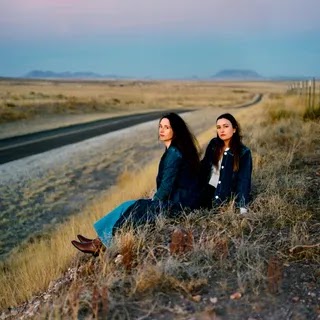Katie Crutchfield and Jess Williamson’s debut as Plains sends it back to the ’90s with a thoughtful, personalized interpretation of old-school country-pop.
Maybe the term “’90s country” means nothing to you; maybe it invokes your entire musical upbringing. Whatever the case may be, that decade of country music—which encompassed everything from the exquisite Car Wheels on a Gravel Road to the novelty “Achy Breaky Heart”—is often looked back at nowadays with heavy sentimentality by those who remember it, a rose-tinted counterpoint to the slick, snap-track country-pop that’s become Nashville’s cash cow. The biggest stars of that era—Shania Twain, Garth Brooks, Martina McBride —were able to meld three-chords-and-the-truth narratives with big-stadium affability on a scale that hasn’t been replicated since. It was also a time before country music was burdened by post-9/11 jingoism, and when the industry arguably made greater strides towards gender parity than it does today—all compelling reasons to ache for its return. “Why don’t we all just start putting our ’80s and ’90s records on and let’s figure out, what is country music?” Kelly Clarkson declared in a 2019 slam against modern country radio. “What is the sound we like again?”
You could do worse than to ask Katie Crutchfield and Jess Williamson, daughters of Alabama and Texas, respectively. Their new album, I Walked With You a Ways, their first as the duo Plains, is not an exact pastiche of Trisha or Shania or any of the other women who commandeered country airwaves while Crutchfield and Williamson were young. Nor is it a vague homage to those artists, either; this is a thoughtful, personalized interpretation of old-school country-pop that only two musicians intimately familiar with its sounds and sensibilities could produce. “We came back to it almost inevitably—like, it’s in us,” Williamson has said. I Walked With You a Ways is a nostalgic yet clear-eyed endeavor, rife with wistful memories and fresh starts. The fact that both members of Plains began their careers running away from these roots, making their names as indie acts before circling back to something folksier during the pandemic (Crutchfield with Waxahatchee’s Saint Cloud, Williamson with Sorceress), only deepens this album’s feeling of homecoming.
Produced by Brad Cook, who also assisted Crutchfield on Saint Cloud, the songs take on the same graceful warmth and sauntering pace. The two singers trade lead vocals and songwriting credits, linking the two halves together through their splendid harmonizing. A track like “Hurricane” might’ve fit well on Saint Cloud as another one of Crutchfield’s methodical, solitary musings on incongruous relationships, but paired with Williamson’s backing vocals, it takes on a new level of grandeur. Conversely, Cook’s production strips back the polished reverb and glittering embellishments that Williamson utilized on Sorceress. Her twang is on full display here, wringing sorrow out of the album’s centerpiece weeper, “Abilene,” and fitting right into the tradition of crystalline country vocalists of Dolly Parton and Margo Price. It makes you wonder why she hasn’t been singing like this for longer.
In Crutchfield and Williamson’s world, breakups are a fact of life, as commonplace and mundanely tragic as the rundown gas stations on a two-lane highway. Their songwriting is more direct than their past work, favoring simpler phrases and evocative still lifes (pink carnations, a cigarette butt in a potted plant). But both artists still relish a circuitous way of storytelling, drawing out a single moment of revelation across a whole song. Take “Summer Sun,” where Williamson offers a meandering apology to someone she dated while old wounds were still fresh: “You had no reason to be afraid that my heart was hidden behind a wall that came before you.” Across her songs, Crutchfield advocates for a partner to rise to her high standards, calling them out on their avoidance and dishing out hard-earned sage advice. “You know you can’t lose a fight if you take cover or abandon it,” she intones, not unkindly, on “Easy.” They make space for the disappointment and heartache while keeping empathy for whoever’s on the other end.
Like all albums birthed out of a particular music fascination, the influences on I Walked With You a Ways are widespread and a joy to uncover with each listen. “Line of Sight,” with its wandering dobro and humming Wurlitzer piano, recalls the Chicks both in their ’90s heyday and their darker, alt-pop turn on 2006’s Taking the Long Way. Williamson covers “Bellafatima,” by contemporary Texas singer-songwriter Hoyt Van Tanner, and transforms it into a waltz that sounds as old as the prairie itself, the kind that Parton, Emmylou Harris, and Linda Ronstadt might have included on their pair of Trio albums. These callbacks are subtle enough to never upstage the main heartlines running through the album; a mournful guitar solo might sneak in for a moment between chorus and second verse, or an organ might take up a call-and-response melody on “No Record of Wrongs,” only to fade back into the cozy backdrop of acoustic strings and drum brushes.
Outside of the mainstream, more artists as of late have donned their cowboy hats and done their best spin on vintage Americana. Call it the Spotify Indigo breed of country, if you must. Cult favorites like Price, Tyler Childers, and Sturgill Simpson imbue their traditionalist leanings with an anti-authoritarian streak. Others, like Orville Peck or the “Merle Haggard with a Pax” outlaw Dougie Poole, tap into gimmicky yet sincere subversions of a modern country star’s subject matter. Plains, by comparison, feels much less weighty, a logical conclusion to two girls who wore out CDs by Deana Carter and the Judds. Country has been their guiding north star, and it’s a privilege to finally get to see it shine.



0 comments:
Post a Comment